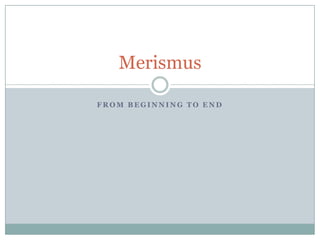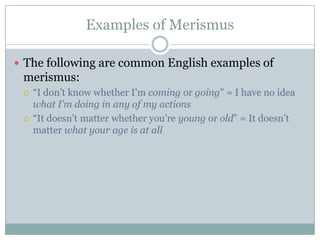Merismus
- 1. F R O M B E G I N N I N G T O E N D Merismus
- 2. What is merismus? ï âMerismusâ comes from a Greek word meaning âdivisionâ ï Merismus refers to a literary device where two words (often contrasting) or two parts of something stand for the whole
- 3. Examples of Merismus ï The following are common English examples of merismus: ïĄ âI donât know whether Iâm coming or goingâ = I have no idea what Iâm doing in any of my actions ïĄ âIt doesnât matter whether youâre young or oldâ = It doesnât matter what your age is at all
- 4. Merismus in the Bible ï The biggest cluster of examples of merismus in the Bible can be found in Ecclesiastes 3 ï Verse 1 makes clear that examples of merismus follow: âFor everything there is a season, and a time for every matter under heavenâ (ESV) ïĄ Verse 2: âa time to be born, and a time to dieâ = a time for every stage of life from birth to death ïĄ Verse 4: âa time to weep, and a time to laughâ = a time for every human emotion between sorrow and joy ïĄ Verse 8: âa time to love, and a time to hateâ = a time for every human emotion between love and hate
- 5. Identifying Merismus ï It is not always clear whether something is a merismus, but it can sometimes be important for interpretation to decide if something is a merismus or not: ïĄ In Genesis 2:17, is âthe tree of the knowledge of good and evilâ a merismus? ïĄ What would this phrase mean if it was a merismus? How would the meaning be different than if this was only a contrast?
- 6. So be on the lookout next time you see a merismus. You donât want to miss out on a jot or tittle of what the author is saying.





